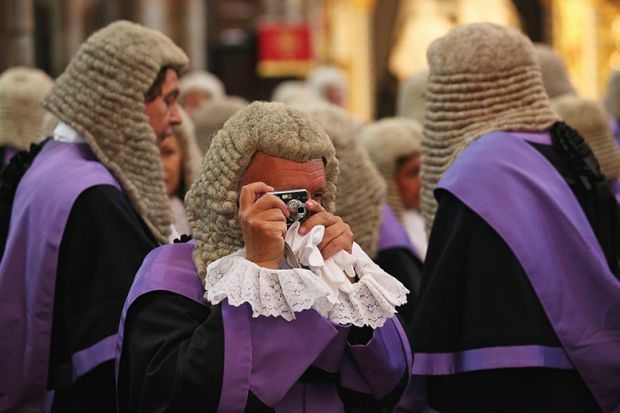The Westminster government’s free speech bill will provide “security to political minorities” in English universities, but could embroil institutions in potentially costly legal action and force students to “risk-assess the life out of campus”, observers said.
A Higher Education (Freedom of Speech) Bill was included in the Queen’s Speech on 11 May, with the legislation due to be introduced to Parliament on 12 May.
The bill includes the key features outlined by the Department for Education’s policy paper on the issue in February, including the appointment of a free speech and academic freedom champion to the board of the Office for Students, the strengthening of existing free speech duties on universities and the extension of them to students’ unions, and enabling individuals to sue for compensation over breaches of free speech laws.
It also proposes the creation of a “statutory tort” that would enable individuals to sue universities and students’ unions for compensation “if they have suffered loss” as a result of a breach of institutions’ duties to protect free speech on campus under Section 43 of the 1986 Education Act.
This would give a “new right of action” to groups including students and academic staff “who are disciplined because of their views” or “visiting speakers who are disinvited or ‘no platformed’”, the policy paper said.
Eric Kaufmann, professor of politics at Birkbeck, University of London and co-author of a report for the Policy Exchange thinktank that was source for the key proposals in the DfE policy paper, said the “most important difference” the legislation would make to life in universities “will be the security the bill will provide to political minorities in the university who wish to dissent from prevailing orthodoxies”.
But Smita Jamdar, head of education at law firm Shakespeare Martineau, said that the “introduction of the statutory tort will almost certainly involve universities in more legal action”.
“We are not an especially litigious society, but in this area there are likely to be those who are happy to press forward with legal action, either on the grounds of principle or ideology…or simply to support an attack on universities more generally. This will entail resource and expense on the part of universities,” she said.
“Some of the cases may be small claims, where even if the university is successful in defending the claim, it will not recover its legal costs. Even getting rid of vexatious claims by striking them out can be expensive.”
In terms of groups that could see openings in the new law, the Free Speech Union created by right-wing commentator Toby Young already says on its website that “if you’re a student being investigated by your university for breaching a speech code, we may take up your case with the university”.
James Murray, a senior associate at the law firm Taylor Vinters, said it seemed “very likely” that organisations such as the Free Speech Union would use a statutory tort “to increase pressure on universities by supporting its members in threatening and pursuing multiple claims where academic freedom and free speech issues are concerned”.
“Universities will need to take careful advice on what the new law requires of them, and the new regulatory and litigation risks to which they will likely be exposed,” he said.
Dennis Farrington, co-author of The Law of Higher Education, pointed out that Section 43 of the Education Act was introduced by the Thatcher government in response to student protests against Conservative speakers on campuses, calling it “a bit of a knee-jerk reaction” in which “doubtless nobody really thought through how it was going to be enforced”.
“In a tort claim a judge would have to decide whether an individual has suffered harm and should be compensated for the higher education provider’s failure to protect freedom of speech under the enhanced Section 43,” he said.
“I can imagine that this would open an avenue for multiple claims against higher education providers that did not get this right, despite having been subjected to new regulatory requirements.”
A “better alternative” would be to make protection of free speech a condition of contracts, Dr Farrington argued.
Patrick O’Donnell, president of the University of York Students’ Union, who is among a group of union leaders who have proposed a new code for students’ unions on campus political diversity and freedom of expression, said: “The danger with the government’s statutory tort is that it will have a chilling effect – students’ unions or their student groups weighing up inviting an external speaker may well conclude that the risks are outside of their control yet too great.
“The government should work with us to broaden and deepen engagement with controversial views – not cause students to risk-assess the life out of campus.”
POSTSCRIPT:
Print headline: New bill ‘will have chilling effect’ on free speech
Register to continue
Why register?
- Registration is free and only takes a moment
- Once registered, you can read 3 articles a month
- Sign up for our newsletter
Subscribe
Or subscribe for unlimited access to:
- Unlimited access to news, views, insights & reviews
- Digital editions
- Digital access to THE’s university and college rankings analysis
Already registered or a current subscriber? Login








